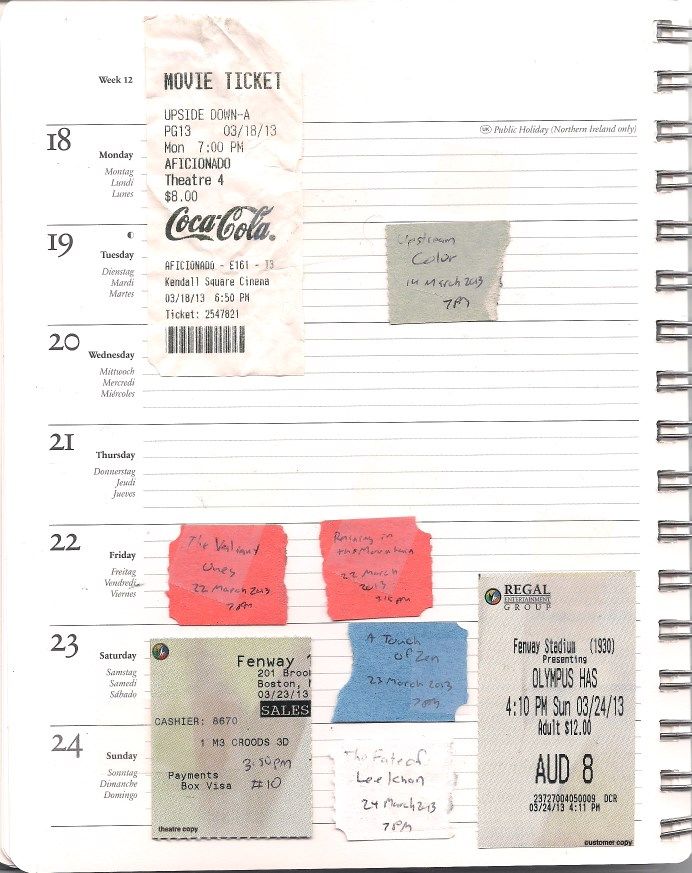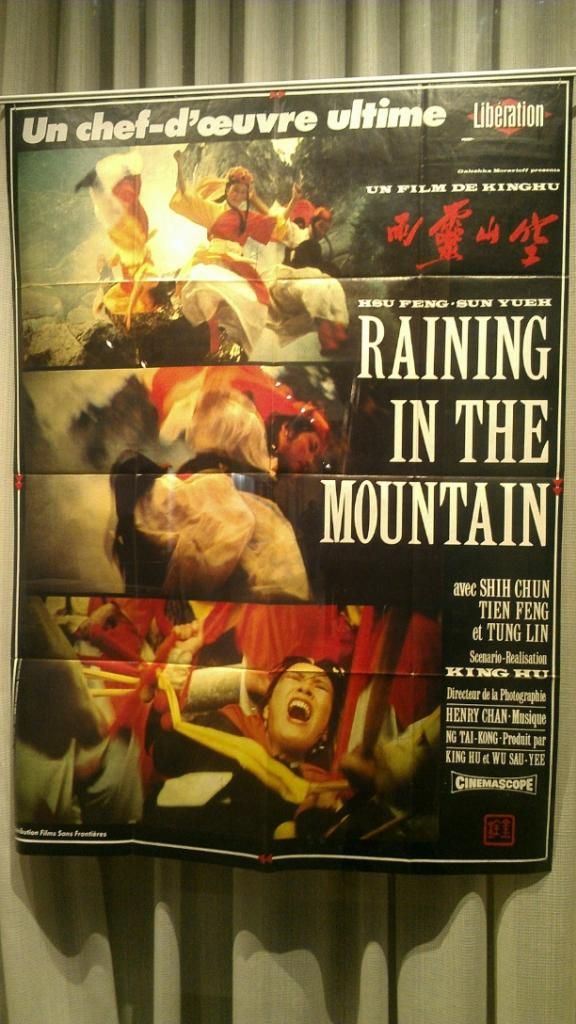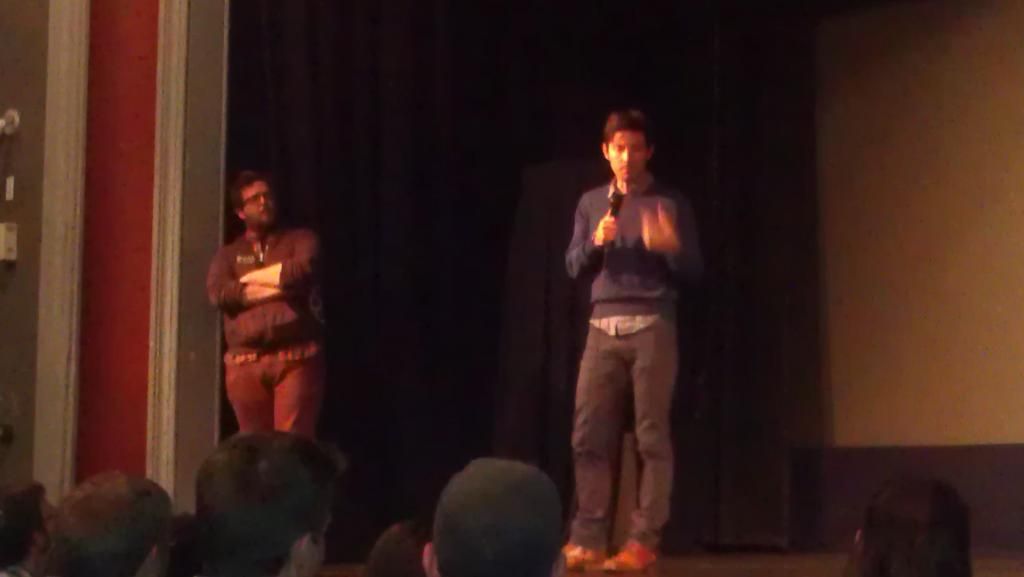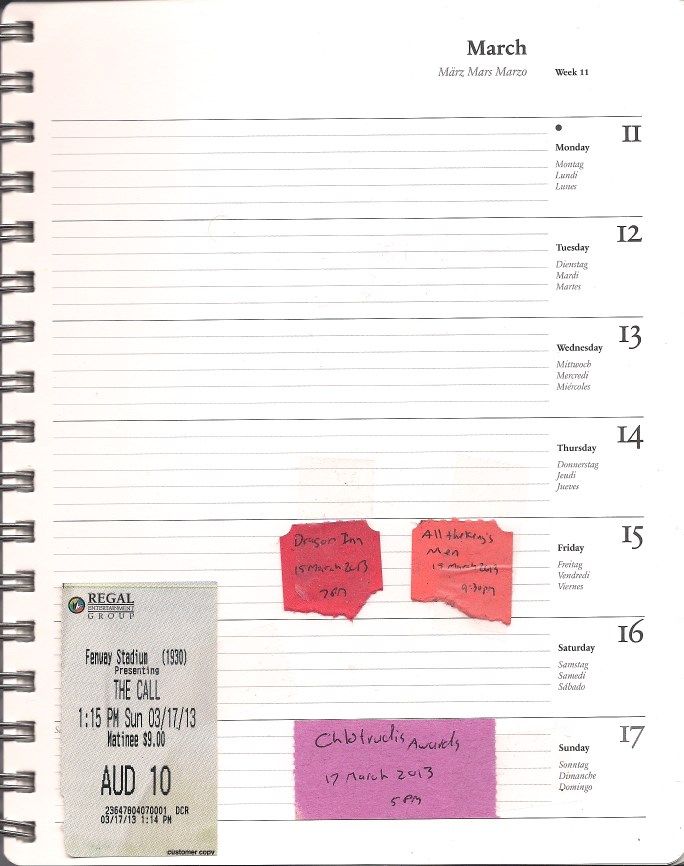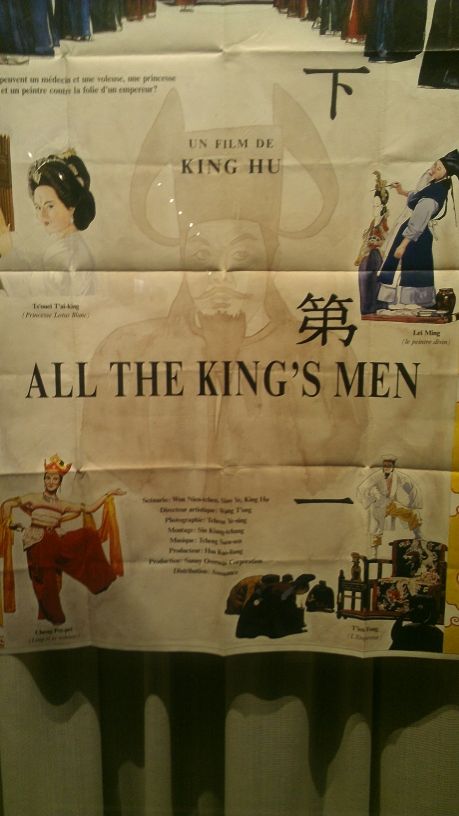Like I said
last week, this was a pretty great series that got my butt in a seat at the HFA for a good chunk of the weekend, and
their program explains why. The difference is that this time, I actually had time to make everything I wanted to, although it was a fairly near thing on Saturday and Sunday: One day, I dallied at the comic shop and grabbing a snack before the three hour movie and wound up coming in mid-introduction; the other, I only had about a half hour to get to the HFA from Regal Fenway and was honestly quite lucky that I had about zero wait for the 47 and 1 buses.
Also sort-of lucky: When they had a last-minute problem with rights and couldn't get
Legend of the Mountain for Sunday night, they substituted
The Fate of Lee Khan, one of the ones I missed last week because of the Chlotrudis award ceremony, and one which I was quite glad to get the chance to see, because it was a blast. It was, as you might imagine, the most sparsely attended screening, as most of the audience for it probably went to the first screening when it was expected to be the only one. Naturally, once they had to cancel the screening, they were able to clear up the rights issues, and suggested that it might make it onto the schedule at a later date. If that's the case, then it appears I was lucky enough to only miss
Come Drink With Me. A shame, but it's also the one that's readily available on video.
Another bonus: I wasn't really expecting this weekend to have as much Sammo Hung involvement as it did. I'd sort of thought of this period as before his time, but one of the things I remembered being mentioned when he appeared at the New York Asian Film Festival a couple years back was that he started a bit earlier than some of his famous Peking Opera School classmates and brought them into the film industry, so I shouldn't be surprised to see his name popping up on this movies from the first half of the 1970s. He choreographed the fights in
The Valiant Ones and
The Fate of Lee Khan and also appeared in
A Touch of Zen and
The Valiant Ones (although I wonder if the IMDB/HKMDB listings for the latter are incomplete - I was sure he played one of the fighters in that as opposed to the Japanese villain with the painted face). That was a really pleasant surprise, as he's a favorite and it's a nifty surprise to see him show up in those, even if he's one of those actors I tend to think of as springing into existence middle-aged, making "young Sammo" look strange to me.
Oh, and just for a bit of symmetry with last week's posting, here's a shot of the nifty poster hanging in the lobby this week:
Not quite so helpful as last week's, although I was able to find
the Hong Kong Movie Database instead, which does a pretty good job of filling in the blanks plain old IMDB leaves. Eventually, I'll hopefully find a good site like this for every country whose movies I watch.
Zhong lie tu (The Valiant Ones)
* * * ¾ (out of four)
Seen 22 March 2013 in the Harvard Film Archive (King Hu and the Art of Wuxia, 35mm)
It's stereotyping things a little - okay, a lot - to suggest that the audience that comes to a King Hu series as the Harvard Film Archive whose program talks about the effect these movies had on the Taiwanese film industry or how Hu's
wuxia films were like Kurosawa's samurai films or Ford's westerns (superficially pulpy but thematically rich) can't love the same sort of things as the crowd for the late and lamented "Weekly Wednesday Ass-Kickings" series. But even if you reject that claim entirely, you've got to admit - any movie that has an audience in the HFA making swishing sounds during the swordfights is doing something right.
Attacks by Japanese pirates and native bandits along the coast of China during the reign of Ming emperor Chiang-chen (Zhao Lei) have become enough of an issue that even that decadent monarch decides something needs to be done, and the new governor he appoints for the province, Lin Mao-he (Wu Chia-hsiang) decides that General Chi Li-te (Ho Li-jen) will not be enough to solve the problem. He brings in Colonel Yu Ta-yu (Roy Chiao), who is not just a fine swordsman, but has equal reputations for being devious and cocky. He not only brings a group of soldiers, but a pair of secret weapons: Wu Chi-yuan (Bai Ying), the former bandit known as "The Whirlwind", and his wife Re-shi (Hsu Feng).
Yu Ta-yu has a fair number of men with him, and there's a seemingly endless number of bandits to deal with. That means we're in for a lot of fight scenes - the action's not quite non-stop, but the pauses in between are by and large about Yu plotting where he will next attempt to fight the pirates or attempting to defeat them with subterfuge. King Hu and company knew why people were going to buy tickets for this, and he gave the audience what it wanted. The action isn't just massive in quantity, though - with the action directed by then-up-and-coming fight choreographer Sammo Hung, who also has a role as one of the main villains, it's fast-paced and hard-hitting. There's so much action that one sequence, where the Wus fight a series of bandits in order to demonstrate their skills (including future star Yuen Biao among others), actually starts to seem like too much, with the audience well ready for some more plot by the time it's over.
Full review on eFilmCritic.
Kong shan ling yu (Raining in the Mountain)
* * * (out of four)
Seen 22 March 2013 in the Harvard Film Archive (King Hu and the Art of Wuxia, 35mm)
There's a special delight to be found in setting a heist caper in a place where everybody should be above that sort of criminal activity - well, more so than we all should. That's a big part of what makes
Raining in the Mountain a lot of fun at its best moments, and why any swing back toward sincerity is something that must be handled carefully.
The goal of this particular band of thieves is a scroll written by the monk Tripitaki himself. It is stored at the Three Treasures Temple, whose abbot is retiring, and has asked Esquire Wen (Suen Yuet) to help him choose a successor. Coveting the scroll, Wen has two plans - firstly, the abbot's second disciple Hui Wan (Lu Chan) has agreed to give it to him if chosen, but the woman he introduces as his concubine is actually White Fox (Hsu Feng), a master thief. Wen isn't the only friend advising the abbot, though - General Wang Chi (Feng Tien) seems to have a similar deal with first disciple Hui Tung (Shih Jun), and his aide Chang Chen is a former policeman who once arrested White Fox. Then there's lay expert Wu Wai (Wu Chia-hsiang), who travels with an entourage of beautiful women, and convict Chiu Ming (Tung Lam), who has paid a special fine to enter the monastery and become a monk at just this time.
It doesn't exactly seem as though anybody in this place has made particularly great progress in freeing himself or herself from desire, does it? There's a vein of cheerfully wry cynicism running through the movie, especially at the start, as the monks sneak off to buy things from merchants and White Fox has trouble understanding exactly both why Wen wants this scroll so badly and how the temple's three treasures can be intangible qualities. The thief, it turns out, may be the most honest person there.
Full review on eFilmCritic.
Xia nu (A Touch of Zen, aka Swordswoman)
* * * ¾ (out of four)
Seen 23 March 2013 in the Harvard Film Archive (King Hu and the Art of Wuxia, 35mm)
A Touch of Zen is widely considered King Hu's masterpiece, finding respect at the Cannes Film Festival several years after a difficult production and underwhelming box office in its native Taiwan. Though not my favorite of the six films I saw in this series, its position as perhaps Hu's greatest is easy to understand; it's a legitimate epic despite the simple foundation it is built on, and scores a lot of points for succeeding in its ambitions.
It starts at Ching Lu Fort, where the run-down mansion of General Chun Luan is said to be haunted. Ku Shen-chai (Shih Jun) lives next door along with his mother (Cheung Bing-yuk); he makes a modest living doing portraiture and calligraphy in a nearby town. His latest customer, Ou-yang Nin (Tien Peng), seems to have a particular interest in anybody who came to town recently, and would likely be particularly curious about Yang Hui-ching (Hsu Feng), who has just moved into the abandoned mansion and is almost quite certainly more than meets the eye.
There are a great number of things that King Hu and company do well with
A Touch of Zen, but perhaps the best is the creation of a constant air of intrigue. The story offers mysteries, certainly, but simply asking "what are the noises coming from the empty house" or "just why is Ou-yang so interested in Dr. Lu" is the easy part. The real trick is in making Shen-chai's curiosity infectious, so that as the movie follows his actions, the audience feels themselves put in his position, peeking around corners, following suspicious characters, and suddenly finding that nothing is as it seems. Hu does a nice job pulling back the curtain, too - even if a lot of the backstory turns out to be a reprise of
Dragon Inn, it's got a new set of enjoyably pulpy details from "The Twenty-Four Crimes of Eunuch Wei" to bodyguards in disguise to monks who cross the screen with quiet but immense power.
Full review on eFilmCritic.
Ying chun ge zhi Fengbo (The Fate of Lee Khan)
* * * ¼ (out of four)
Seen 24 March 2013 in the Harvard Film Archive (King Hu and the Art of Wuxia, 35mm)
If ever two styles ever seemed to be a poor fit, it's the pressure-cooker thriller and the martial arts action movie: Fighters need room to move, after all, and fights tend to bring things between characters to a head rather than just move them along. Making action movies set in and around inns was sort of King Hu's thing, though, and he manages an impressive balance of intrigue and action in this one even while spending a lot of time in the same building.
It's 1366, and while the Mongols control much of China, there's an active resistance, though some of them are willing to turn traitor. One means to betray the rebels to Lee Khan (Tien Feng), Baron of Hunan. Since Lee Khan and his sister and most trusted ally Lee Wan (Hsu Feng) dislike staying in official residences, they decide to make their home base for this mission the Spring Inn - not knowing that proprietor "Wendy" Wan Hsiao (Li Li-hua) is with the rebels, and the four pretty young waitresses she's hired (Angela Mao Ying, Seung-goon Yin-ngai, Woo Gam & Helen Ma Hoi-lun) are also more than they seem. But what of the guests - a drunkard (Ngai Ping-ngo), a beggar (Han Ying-chieh), a pair of bandits (Ho Pak-kwong & Yi Fung), and a merchant (Bai Ying) - how many are spies, and for which side?
Hu doesn't exactly keep the audience in the dark about the various characters' allegiances; as his movies were seldom about the sudden revelation as opposed to the steady forward motion of a well-oiled machine. While there aren't necessarily a lot of chances for swordfights to break out in this movie, it often plays out like one - feints, parries, taking steps forward and back, finally ending as the combatants put all their strength into killing blows. It's a nice little dance, with the flow only occasionally interrupted toward the beginning as fights break out in the Spring Inn so that the audience can see what sort of skills the characters bring to that situation.
Full review on eFilmCritic.

